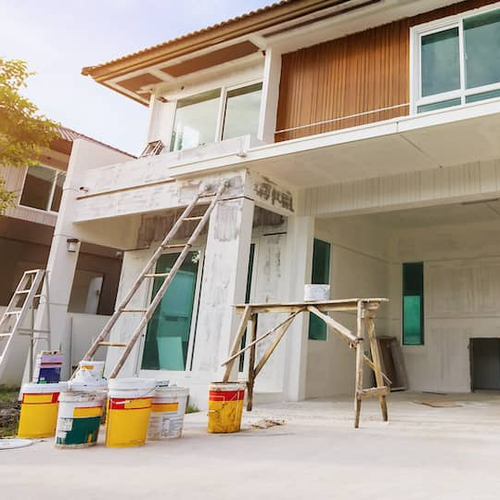Renovation and remodeling: The differences explained
Feb 25, 2024
•6-minute read
When it comes to updating your outdated kitchen or revamping your home for your growing family, you want to either renovate or remodel your home.
Renovation and remodeling are two terms often used interchangeably, but they pertain to different aspects of home improvement.
Looking to freshen up your space or wholly transform it? Then, understanding the distinction between renovation and remodeling is essential when talking to a contractor or a mortgage lender.
What’s the difference between a renovation and remodeling?
Let’s take a closer look into the distinct differences between renovating and remodeling your home.
| Renovation | Remodeling |
|---|---|
|
Updating a room or home |
Altering floor plans |
|
Small projects that take a couple days |
Big projects that take months |
|
Replacing fixtures |
Removing and adding walls |
|
Repairing existing structures |
Completely tearing down rooms |
|
May not need permits |
Will need permits |
What is a renovation?
When you renovate your home, you’re making significant changes to your home's structure, layout or design to improve its functionality, aesthetics or both. A home renovation involves transforming your existing living space into something more appealing and tailored to your needs. For example, let's say you have a small, outdated kitchen that doesn't suit your cooking style or accommodate your growing family. In this case, a home renovation could involve:
- Installing new cabinets and countertops
- Upgrading appliances
- Replacing a kitchen tiles
This transformation can provide a more functional and modern kitchen that suits your lifestyle better. When contemplating a home renovation, there are several important factors to consider. First and foremost, you need to establish a clear vision of what you want to achieve with the renovation. Consider your goals, priorities and how the renovation will enhance your living space.
Budgeting is another crucial factor. Determine how much you’re willing to spend on the renovation, and make sure to allocate funds for unexpected expenses. Obtaining multiple quotes from contractors and suppliers is advisable to ensure you’re getting the best value for your money.
Consider the timeframe for the project. Home renovations can disrupt your daily life, so prepare for potential delays. Communicate with your contractor to establish a realistic timeline and make sure to factor in any necessary permits or approvals that may be required.
Furthermore, consider how the renovation will affect your lifestyle during and after the project. Will you need to relocate temporarily? How will the renovation impact your daily routine?
Lastly, research and hire reputable professionals for your home renovation project. Follow up on references, read reviews and ensure they have the necessary licenses and insurance. Clear communication and a good working relationship with your contractor are key to a successful renovation.
Pros and cons of renovations
Renovating a home comes with several benefits, like how much more money you can save when renovating a home versus remodeling it. One of the main advantages of renovating is that it allows homeowners to update and improve their living spaces without needing to demolish and build their homes back up. Another benefit of home renovations is that they can significantly boost the property's value when it's time for you to sell. Investing in capital improvements (a permanent structural alteration or repair to a property that improves it substantially, thereby increasing its overall value) such as upgrading the kitchen or bathroom is a good way to achieve this. When it comes time to sell your property, the added value can help attract potential buyers and potentially lead to a higher selling price.
However, while home renovations have many benefits, it’s important to be aware of the potential drawbacks, like the cost involved. Even though renovations are generally more affordable than remodeling, they can still be a significant financial investment. Homeowners should carefully consider their budget and prioritize the renovations that will provide the most value and satisfaction. Another drawback of home renovations is the disruption they can cause to daily life. Depending on the scale of the project, renovations can lead to noise, dust and limited access to certain areas of the home. This can be especially challenging for families with young children or individuals who work from home. Planning and scheduling renovations carefully can help minimize the disruption, but it’s essential to be prepared for some inconvenience during the process.
What is a remodel?
Remodeling your home is a significant improvement project involving changes or updates in an existing space. A few examples of a remodel include:
- Tearing down your kitchen wall to open it up to the living room.
- Completely redesigning the layou of your bathroom, moving the sinks and toilet and adding a shower.
- Adding a bedroom, bathroom and egress window to your basement to create livable space.
Undertaking a remodel requires careful planning, coordination and execution. The time commitment is one of the most crucial aspects to consider. Depending on how much you would like your home to be remodeled can take weeks, months or even longer to complete. Having a realistic timeline and being prepared for potential delays along the way is essential.
Another commitment that comes with a remodel is the cost. Expenses can vary widely depending on the size, complexity and desired outcome. It's important to set a budget and stick to it, considering the materials and labor costs and any unexpected expenses that may arise during the process. Being financially prepared to remodel your home by budgeting can help eliminate some of the stress associated with the cost commitment.
Dealing with the commitments of a remodel can be challenging, but there are some tips that can help homeowners navigate the process more smoothly. Firstly, it's crucial to do thorough research and planning before starting the project. This includes gathering ideas, creating a detailed budget, and finding reputable contractors or professionals to assist with the remodel. Taking the time to plan and prepare can help minimize unexpected surprises and make the process more manageable.
Communication with the professionals involved in the remodel is also another great help. Regularly checking in with the contractor or designer can help ensure that everyone is on the same page.
Pros and cons of a remodel
Remodeling a home offers numerous advantages that can enhance the property's functionality and value. One of the main advantages is the ability to change the layout of the house according to your specific needs and preferences. Whether you want to create an open-concept living area or add an extra bedroom, remodeling allows you to make an addition to the home that can increase its value. This can include adding an extra bathroom, expanding the kitchen, or creating a new entertainment area. By increasing the square footage and adding modern amenities, you can significantly enhance the comfort and convenience of your living space.
However, one of the main drawbacks of remodeling is the additional cost of remodeling a home. Depending on how much of your home you want to be redone, the expenses can quickly add up, especially if you opt for high-end materials or hire professional contractors. It’s essential to carefully plan and budget for the project to avoid any financial pop-ups.
Should you renovate or remodel?
When you are determining whether you should renovate your home or remodel your home, here are some questions you should consider:
- What is your budget?
- How long do you plan to stay in your home?
- What are your goals for the project?
- Do you have the time and skills required for a DIY project?
- Do you want to add value to your home?
- How will the project impact your daily life?
- Will you hire a contractor?
- Are you going to sell your home soon?
Renovation and remodeling FAQs
Now that we've explored the differences between remodeling and renovating a home, let's look at some frequently asked questions.
What’s the difference between renovation and restoration?
Renovation refers to the process of improving or updating a space, usually for functional or aesthetic purposes. Restoration, on the other hand, involves returning a space to its original or historically accurate state, preserving its original features and materials. While both involve making changes to a space, renovation focuses on modernization, while restoration emphasizes preservation.
What does remodeling consist of?
Remodeling typically involves making changes or improvements to a building or space. This can include renovations such as updating fixtures, painting walls, replacing flooring or redesigning the layout. The scope of a remodeling project can vary depending on the goals and budget of the individual or organization undertaking it.
What are the two types of remodeling?
Interior remodeling and exterior remodeling are the two types of remodeling. Interior remodeling involves making changes to the inside of a building, such as renovating a kitchen or bathroom. On the other hand, exterior remodeling focuses on improving the outside of a structure, such as adding a patio or replacing siding.
What does a full renovation mean?
A full renovation refers to a comprehensive overhaul of the area of the home being renovated, typically involving significant changes to its structure, layout and aesthetics. It often includes demolishing existing elements, such as walls or fixtures, and replacing them with new ones. This process aims to completely transform the space, keeping the home area up to date and meeting the desired vision that the homeowner wants.
The bottom line
As you can see, there is a vast difference between renovating and remodeling a home. Renovating your home involves making cosmetic changes to enhance the appearance of your home without altering its structure; remodeling focuses on transforming the structure and layout of a home. Both renovation and remodeling can significantly increase a home's value and improve its functionality. If you're considering a home project but lack the necessary funds, applying for a home equity loan can be a viable solution. With a home equity loan, you can tap into the equity you've built in your home to finance your renovation or remodeling project. Whether you're looking to refresh your home's appearance or completely transform its layout, a home equity loan can help you turn your vision into a reality.

Kara Porter
Kara Porter is a freelance writer for Rocket Companies, focusing on mortgages and personal finance. She delivers clear, informative content to guide readers through the complexities of homeownership and financial planning. Kara recently graduated with honors from Southern University and A&M College and is set to begin her master's program at Syracuse University.
Related resources

10-minute read
Home improvement grants to fund your next repair project
Home improvement grants are a type of financial aid for homeowners to make necessary repairs to their home. Check out our guide to find grant resources.
Read more
7-minute read
A guide for understanding home improvement loans
Home improvement loans can help you finance anything from a few cosmetic changes to a major renovation. Figure out what loan option is right for you.
Read more

7-minute read
Using a home equity loan for your remodel: What to know
Thinking about a home remodel? If you have enough equity, a home equity loan could help you pay for it. Learn the benefits, risks, and tips for using one.
Read more